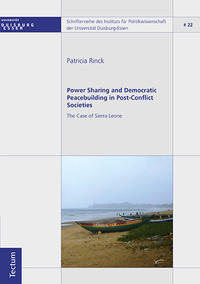
Power sharing has become a common way of ending violent conflicts since the 1990s, particularly in Sub-Saharan Africa, in the hope that it positively impacts on both peacebuilding and democratisation. Whether power sharing can actually achieve this is however contested. Bringing together the two strands of power sharing research, which deal with its effects on democratisation and peacebuilding respectively, Patricia Rinck examines how non-ethnic power sharing between former adversaries contributes to, or obstructs, democratic peacebuilding in post-conflict societies. Besides theory, Patricia Rinck discusses the controversial yet crucial role power sharing played in Sierra Leone: after almost a decade of brutal civil war and several failed peace agreements, the power-sharing Lomé Peace Agreement between the Sierra Leonean government and the Revolutionary United Front (RUF) of July 1999 was supposed to end the war and bring peace and democratisation to the war-torn country. Complemented by interviews conducted on site in 2013, the case study analyses how power sharing impacted on democratic peacebuilding, scrutinising its effects on the state monopoly of force, democratic participation and culture of constructive conflict management in post-conflict Sierra Leone. By taking into consideration shortcomings in the agreement itself as well as implementation problems, the study allows for a more nuanced assessment of the reasons for its early breakdown. It assesses the effects of power sharing on democratic peacebuilding in Sierra Leone, addresses implications for research on non-ethnic power sharing in particular and proposes practical consequences for designing and implementing similar power sharing agreements.